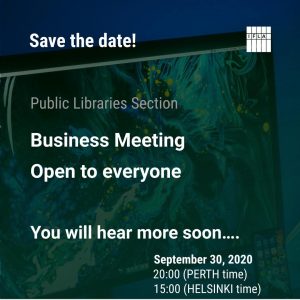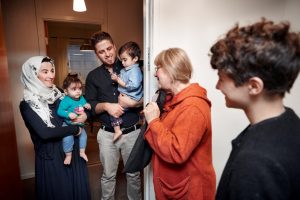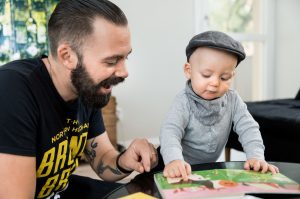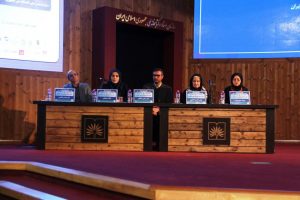Undeniably, COVID-19 has profoundly changed life as we know it. The global pandemic has had a far-reaching impact on the way we live, work, and play, and everyone, including libraries, has had to adjust to a “new normal” at an alarming pace. In Singapore, the Circuit Breaker was implemented in April to contain the spread of the coronavirus and residents, especially the elderly were advised to stay at home. This meant that all non-essential workplaces including our public libraries were closed for almost two months. This unexpected situation meant that we had to promptly rethink our operations and current model of programme delivery for older adults and devise new ways to keep them meaningfully engaged at home. Before, our programming was mostly focused on onsite activities – many of which were designed with the aim of bridging the digital divide among older adults in mind.
Some examples include our partnerships with other organisations to introduce programmes that promote basic digital literacy through one-on-one assistance from volunteers, classroom training, and learning communities. For older adults who were ready to take their digital skills to the next level, we also rolled out hands-on workshops that tackled more complex topics, such as coding, app development and movie making. This helped to fuel their creativity and sustain their interest in the digital sphere.
While these digital readiness initiatives were already in place, the COVID-19 situation established the need to scale them up and deliver them in new ways. Bearing in mind that everyone has varying interests and familiarity with technology – it was crucial to curate programmes that could cater to most, if not all. Another key consideration was that certain types of programmes would not translate well onto an online platform: this included workshops with a heavy emphasis on hands-on activities, or those that required one-to-one guidance from the instructor. Programme duration was another factor: information had to be delivered in bite-sized chunks due to the possibility of “Zoom fatigue”.
Engaging Older Adults Through Online Programming
From the onset, we knew that we wanted to curate a suite of fun, exciting, and engaging programmes for older adults, involving programme concepts we had never done before. Some environmental scans and brainstorming sessions later, we birthed the #StayHome series, our very first online series for older adults. The #StayHome programme series comprise Read, Learn, and Play editions, and featured book recommendations, creative workshops, and games that covered a wide range of topics suitable for those aged 50 and above. These programmes were conducted by librarians or volunteer facilitators. On top of content creation, we supplemented all our virtual programmes with a curated list of eBooks and electronic resources that participants would find useful for continuing their learning in that particular domain. Here is more about the different editions:
#StayHomeAndRead: Spotlights eBooks and encourages the love of reading. Sessions featuring non-fiction titles were complemented with hands-on activities (derived from the eBooks) to make reading and learning fun and interactive.
Past topics: Exploring the Fantasy Genre, PressReader App, Forest Bathing, K-pop
#StayHomeAndLearn: Covers a wide range of topics so older adults can learn and stay relevant and connected to trends.
Past topics: Digital Housekeeping, Social Media, Coding, App Development
#StayHomeAndPlay: Engages older adults through cognitive games to improve their mental well-being.
Past topics: Print-to-Screen Trivia, Bingo, Word Scrambles
Despite having no prior experience with online programming, our enthusiastic volunteer programme facilitators were raring to explore the possibility of converting their learning communities to online meetups. Their willingness to step up to the challenge and their efforts spent tweaking their respective programme concepts successfully brought four of our volunteer-run learning communities to the virtual platform. The virtual approach was adopted for our major events too, namely the Time of Your Life Celebration in October, which is an annual celebration of older adults in conjunction with the International Day of Older Persons. This year’s event was held in collaboration with the Singapore University of Social Sciences (SUSS), and went fully online with a holistic spread of enriching programmes. This involved local and overseas industry experts deliberating on pertinent issues in the field of gerontology, which sought to inspire older adults to share about what sparked joy and created meaning in their lives.
Getting Older Adults Digitally Ready
Although the social distancing measures have affected all of us, it is safe to assume an uneven impact on the age groups when it comes to digital-readiness. While the younger generation would find it easier to cope with the situation because of their tech-savviness, for the older generation, who are less familiar with technology and often rely on face-to-face communication and in-store purchases, this meant a dramatic change in their lifestyle. Hence, there was an urgent need to get them digitally ready and equipped with the skills required for the new normal, such as video conferencing with their loved ones, ordering food and grocery deliveries, using electronic payment, and discerning fake news.
This was where the Virtual Digital Clinic (VDC), a collaboration with Singapore’s Infocomm Media Development Authority (IMDA), came in. Seniors could join a VDC from the comfort of their own home and get their tech-related enquiries answered by a friendly volunteer during 20-minute consultation session. VDCs are held weekly and are available in our four official languages – English, Chinese, Malay, and Tamil, to make it accessible to all.
Promoting the Joy of Reading eBooks
For book lovers who were unable to get their regular printed reading materials from our libraries, we curated a monthly list of recommended eReads on a range of topics, such as Coming of (Old) Age Fiction, Mental Wellness, and Indoor Exercises. These lists were sent out in the form of Electronic Direct Mailers (EDMs) to our mailing list subscribers, members of our various book clubs and learning communities, as well as strategic partners who could share these EDMs with other older adults beyond our usual reach. This monthly mailer also served as a good opportunity to encourage older adults to browse our digital collections in the safety and comfort of their own home. Along the same vein, our quarterly publication, the Time of Your Life: Good Reads for the 50+ magazine is also available for download from our corporate website1. Written by librarians, this lifestyle magazine features articles on topics ranging from technology to positive ageing, serving as a resource to help older adults keep up with trends.
1 Time of Your Life: Good Reads for the 50+ (digital copy):
Though making the digital leap might seem like a huge hurdle, we encouraged older adults to take the first step with our suite of digital readiness initiatives such as the VDCs. The more tech-savvy were kept meaningfully engaged with our #StayHome programme series and curated eReads EDMs. Furthermore, we held Zoom tutorials for the public, where we supported our volunteer programme facilitators by guiding them on how to use Zoom prior to their sessions to build their confidence in conducting programmes on the virtual platform.
The world has hit the big reset button and we took this opportunity to review our offerings for older adults at the libraries. Libraries around the world face the same challenge of staying relevant, and evidently, this pandemic has only underscored the important role that libraries play – beyond just physical spaces where people borrow books and attend programmes, libraries play a vital role as learning concierges that enable and empower people with (digital) tools and skills to help them navigate the sea of information and the world beyond.
Raneetha Rajaratnam, Director, Public Libraries Singapore




